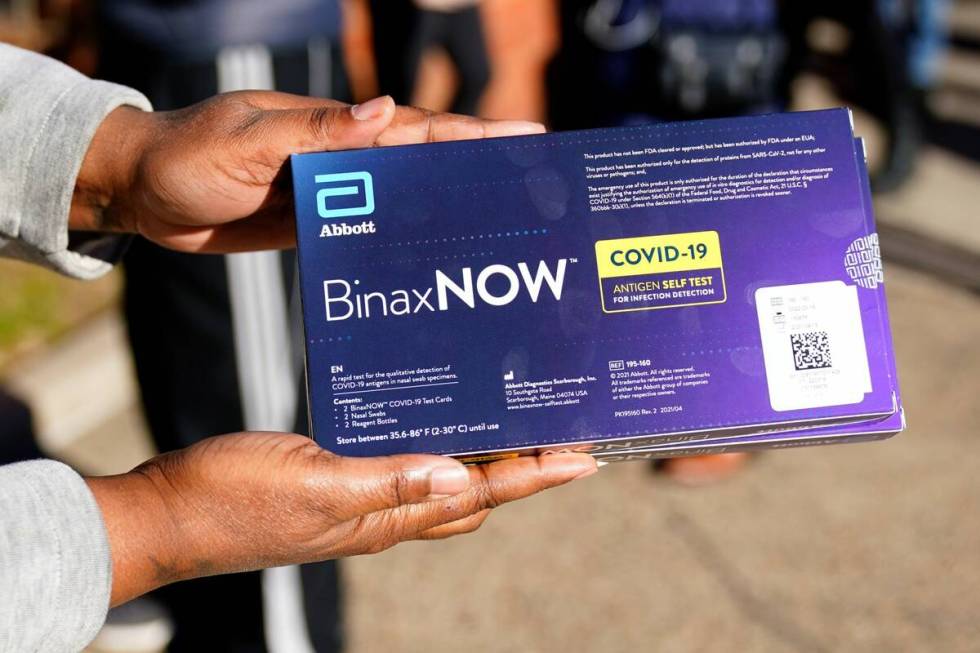Here’s how to keep coronavirus from spoiling the holidays

In the countdown to Christmas, it’s time to stock up on eggnog, wrapping paper and, possibly, rapid home COVID-19 tests.
Taking a rapid test before a holiday gathering can be part of an overall strategy for celebrating more safely as coronavirus cases continue to climb, health officials say.
This season’s holiday guidance is more nuanced than last year’s, when public health officials cautioned against gathering with people from other households.
The key reason is that this year a significant portion of the population is vaccinated, Dr. Marc Kahn, dean of the Kirk Kerkorian School of Medicine at UNLV, said this week.
But with two highly transmissible coronavirus strains circulating — delta and omicron — he and other authorities urge everyone — including the fully vaccinated and boosted — to take precautions, offering these tips:
Is it safe to attend a holiday party?
It depends, authorities say. Large parties aren’t as safe as small ones. Indoor parties aren’t as safe as outdoor gatherings.
At a large, indoor party, one person without a mask can result in many people being infected, said Dr. Celine Gounder of the NYU Grossman School of Medicine.
“Some of these are turning into superspreader events,” Gounder told the Associated Press.
Even if everyone is vaccinated and boosted, breakthrough infections can happen, including with omicron, which has shown the ability to sidestep the protection of vaccination in lab tests.
Health authorities recommend wearing masks, opening windows and running an air purifier with a HEPA filter to make indoor gatherings safer.
The risk at any gathering increases if some of those attending aren’t vaccinated or boosted, health officials say.
Cassius Lockett with the Southern Nevada Health District said he had canceled his holiday travel plans because some of those who would be attending a family gathering aren’t vaccinated.
It’s a matter of “personal responsibility to keep yourself and others safe over the holidays,” said Lockett, director of disease surveillance and control. “And I think it’s also a balance of risk and reward.”
What about holiday travel?
Lockett advises people who are experiencing COVID-19-like symptoms, or know they have been exposed to someone with COVID, to stay home and get tested.
He recommends that travelers check whether their destination has high transmission rates. If so, they should up their COVID game by, for example, wearing masks consistently in indoor settings, especially in crowded places such as malls and airports.
People who are traveling for the holidays may want to consider getting a PCR test for COVID-19 prior to traveling and then a rapid test as close as possible to the time of their gathering, said the University of Southern California’s Susan Butler-Wu.
Those planning to travel abroad should check the rules of their destination country. Nations are adding new rules in response to omicron.
What do rapid home tests do?
Rapid tests that can be taken at home add another layer of protection, said Butler-Wu, an associate professor of clinical pathology at USC, where she directs clinical testing for infectious diseases.
“I would still open your windows, and if you can mask, mask,” she said in a phone interview. “It’s not really a replacement for anything, but it’s an important additive tool.”
The home rapid tests are not as accurate as the PCR tests administered at many testing sites and pharmacies. But they have the advantage of giving results within minutes instead of days.
Home test kits can be found online and at drugstores, where they have been known to fly off the shelves. A box with two tests typically costs about $25. President Joe Biden on Tuesday detailed plans to make the tests free of charge and more widely available.
Health authorities caution that the rapid tests are 75 percent to 90 percent accurate in detecting an infection, depending on the specific test. And all tests simply provide a snapshot in time; a person who is negative for the virus one day may be positive the next. This is why some authorities suggest testing over multiple days.
Even so, “Testing is important and it needs to be part of the equation,” Butler-Wu said. However, she cautioned against “sort of declarative statements like ‘I’m definitely safe to be around and therefore, you know, we can have a crazy wild party and forget about COVID.’”
UNLV’s Brian Labus said that rapid tests can be used as “part of your overall protection plan to try and identify people who are infected and infectious but asymptomatic.”
“We didn’t have that option last year. You just had to hope for the best,” said Labus, an assistant professor at UNLV’s School of Public Health. Now, rapid tests “can help you identify people who could be spreading disease unknowingly.”
How else can I protect myself and loved ones?
People should take the common-sense precautions advised throughout the pandemic, such as social distancing and frequent hand-washing, authorities say. Those who are unboosted may want to take greater measures.
“If you haven’t gotten your booster, I would be very cautious about going into groups of people, especially among unvaccinated people,” Kahn said. “If you were unvaccinated, you right now are at extreme risk of contracting a very contagious, potentially lethal virus.”
Health officials continue to urge unvaccinated people to think hard about vaccination, and those eligible to be boosted to get a booster, even though they won’t have full protection before this holiday weekend.
“Your best bet is to get vaccinated,” Lockett said.
Contact Mary Hynes at mhynes@reviewjournal.com or 702-383-0336. Follow @MaryHynes1 on Twitter. The Associated Press contributed to this report.